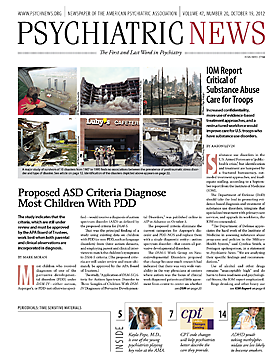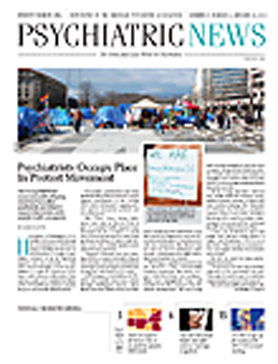Residency training in cognitive-behavioral therapy (CBT) has become much more consistently developed, and while psychodynamic therapy is widely taught, there is a lack of consensus regarding its content and a need for more rigorous evaluation of “competence.”
Those were the principal findings from a nationwide survey of psychiatry residency training directors regarding training in psychotherapy in the September 1 Academic Psychiatry.
Authors Donna Sudak, M.D., and David Goldberg, M.D., surveyed U.S. general psychiatry training directors about the amount of didactic training, supervised clinical experience, and numbers of patients treated in the models of psychotherapy (psychodynamic, CBT, and supportive) mandated by the Residency Review Committee of the Accreditation Council for Graduate Medical Education (ACGME).
Sudak is acting director of residency training and director of psychotherapy training at Drexel University College of Medicine. Goldberg is residency training director and chair of psychiatry at California Pacific Medical Center.
Sudak and Goldberg received 82 valid returned surveys out of 185 sent, for a total response rate of 45 percent. Not all respondents answered all questions, but almost all (76) answered the questions about required seminar and supervised clinical hours and minimum number of patients.
The researchers found that the largest amount of didactic training occurs in psychodynamic psychotherapy. Approximately 70 percent of programs provide more than 30 hours, with nearly 25 percent reporting 70 hours or more. Almost one-third offer less than 30 hours over the course of residency training.
Less time is devoted to CBT didactics, with two-thirds of programs offering less than 30 hours; one-third, more than 30 hours. But Sudak and Goldberg noted that this marks a significant increase from 2001, when only 13.1 percent of programs offered more than 30 hours. About 85 percent of programs reported less than 30 hours of supportive-therapy didactics, but it is not possible to know whether they were included as part of psychodynamic or CBT training.
The findings regarding didactic training are largely encouraging, suggesting that residency programs have responded to a mandate from the ACGME for psychotherapy training. Psychodynamic therapy is widely taught, but establishing consensus regarding its content and more rigorous evaluation strategies would improve resident competence, they wrote.
And supportive therapy, the most widely practiced form of treatment, needs better definition and pedagogy development.
In an interview with Psychiatric News, Sudak, who is president of the Academy of Cognitive Therapy, said that following the ACGME mandate for training in psychotherapy, CBT educators worked hard to develop curricula and educational tools and measuring instruments that have helped training directors adopt CBT training. Psychodynamic psychotherapy and supportive therapy training would benefit from the same approach, she said.
“Training directors are incredibly busy, and training requirements are extremely rigorous,” Sudak said. “The more psychotherapy educators can help training directors by providing defined methods by which they can train their residents to a high level of proficiency, the more likely will psychotherapy training be adopted.”
Regarding supervised clinical experiences, responses indicated wide variability: Most programs (73.3 percent) indicated they offer more than 30 hours of supervised clinical psychodynamic therapy, and half of those require greater than 70 hours of supervised training. However, one-quarter of programs offer less than 30 hours total.
CBT supervised clinical experiences have dramatically increased over this decade, to 46.8 percent of programs with over 30 hours and only 6.5 percent with no hours. Approximately half of the programs report more than 30 hours of supervised clinical work in supportive therapy.
“Effective psychotherapy training requires suitable patients,” Sudak and Goldberg stated. “We did not assess how long patients are treated, but residents often provide therapy in settings where treatment can be brief, inconsistent, or incomplete. Furthermore, there are no clear guidelines as to what the optimal didactic and supervised clinical experiences are to produce ‘competent’ residents.”
They concluded that there has been considerable progress over the past decade in psychotherapy education, but inconsistencies remain in the amount and quality of training experiences offered to residents. “There is enormous variation from program to program in how much training is offered, and it’s always a lot easier to have 20 sessions of didactic class than it is to have a clinical service with available patients and faculty to supervise,” Sudak told
Psychiatric News. “That remains the challenge of psychotherapy education. But psychotherapy is a core discipline of psychiatry that needs to be attended to by training directors, and the more we can make it an efficient thing to do, the more training programs will respond.”


